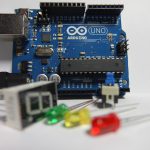
Introduction
The industrial Internet of Things has undoubtedly transformed the manufacturing sector, enabling greater efficiency in recent years. The emergence of 5G technology and 5G manufacturing has further accelerated this digital revolution, providing a robust foundation for Industrial IoT applications in manufacturing. This article demonstrates the crucial role of 5G in enabling Industrial IoT and its impact on the manufacturing industry.
Industrial IoT: A Brief Introduction with Significance
Industrial IoT refers to integrating several internet-connected devices within the industrial sector, including sensors, machines, and systems. The primary purpose is to enhance operational efficiency, productivity, and safety in industrial IoT in manufacturing processes. It extends the concept of IoT, focusing on connecting everyday objects to industrial processes and infrastructure.
In the context of the IoT – Industrial Internet of Things, various devices and sensors are embedded in industrial equipment, machinery, and infrastructure to collect and transmit real-time data. These devices include sensors for specific functionality, such as monitoring temperature, pressure, vibration, humidity, and other relevant parameters. The collected data is then analyzed and processed to derive insights, Optimise operations, and enable informed decision-making.
5G in Enabling Industrial IoT in Manufacturing: Exploring the Crucial Roles and Advantages
5G, fifth-generation technology has integrated with crucial potentials to revolutionise the Industrial Internet of Things in the manufacturing sector, such as:
Ultra-Fast and Reliable Connectivity:
5G network in the manufacturing industry offers enhanced connectivity, significantly exceeding its predecessors’ capabilities. 5G enables seamless communication between machines, devices, and systems with low latency and high bandwidth. This 5G’s enhanced connectivity empowers manufacturing facilities to harness the full potential of IoT, facilitating real-time data exchange, remote monitoring, and control.
Remote Monitoring and Control:
5G facilitates remote monitoring and control of manufacturing processes, allowing businesses to manage multiple operations. Through Industrial IoT applications powered by 5G, manufacturers can remotely monitor equipment performance, track inventory, and make real-time adjustments. This capability reduces on-site personnel needs, lowers operational costs, and enhances operational flexibility.
Scalability and Flexibility:
Manufacturing environments are dynamic and often require operations scalability and flexibility. 5G manufacturing provides the necessary infrastructure to accommodate the evolving needs of Industrial IoT applications. With its ability to support several devices and high data transfer rates, 5G enables manufacturing facilities to scale their operations without compromising performance. This scalability and flexibility empower businesses to adapt to evolving market demands and stay ahead of the competition.
Massive Machine-to-Machine Communication:
Industrial IoT in manufacturing involves a vast network of interconnected devices and machines. 5G in IoT provides the necessary infrastructure to support massive machine-to-machine communication. With its ability to connect many devices simultaneously, 5G enables efficient coordination and synchronisation among various manufacturing process components. This promotes streamlined operations, reduces downtime, and improves overall productivity.
Real-time Data Analytics:
One of the key advantages of 5G in Industrial IoT is the ability to collect and analyse real-time data, leading to increased operational efficiency and cost savings. With its low latency, 5G enables manufacturing facilities to process data instantaneously, providing valuable insights for decision-making. Real-time data analytics helps optimise production processes, predict maintenance needs, and identify areas for improvement.
Improved Worker Safety:
The integration of 5G in IoT allows manufacturing facilities to enhance worker safety by deploying advanced safety systems. Real-time monitoring of worker conditions, such as temperature, heart rate, and exposure to hazardous substances, can be enabled through wearable IoT devices. In emergency scenarios or abnormality, immediate alerts can be sent, allowing swift response and minimising personnel risks.
Automation and Robotics:
5G plays a crucial role in enabling automation and robotics in manufacturing. Integrating 5G with Industrial IoT enables the deployment of autonomous robots, enhancing operational efficiency and reducing human error. 5G ensures smooth communication between robots, machines, and control systems by providing high-speed and low-latency connectivity.
Final Thoughts
The role of 5G in enabling Industrial IoT in manufacturing is undeniably transformative. It revolutionizes connectivity and offers several ways to optimise its manufacturing processes and operations. Manufacturing businesses are increasingly adopting digital transformation. By leveraging 5G power and Industrial IoT, these firms will unlock new levels of efficiency, productivity, and innovation, ultimately shaping the future of the manufacturing industry.





















